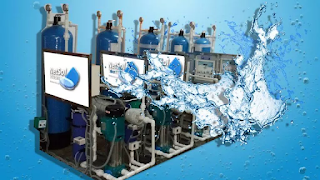When is it necessary to use UF for RO?
All pollutants, viruses, and bacteria in the water can be killed by the UF or Ultrafiltration water purifiers. UF stands for Ultrafiltration, which quickly and easily gives us the purest drinking water available. It is the most cost-effective option because it also kills microorganisms. UF water filter is needed to get chlorine out of the municipal water sources as well.
Of all water filters, UF is the most straightforward. It has a single membrane for a UF filter. The solvent can travel through the semi-permeable membrane. Larger foreign molecules are flushed out of the drainage pipe. It works well in places where the tap water is well purified.
But, the question arises! Is it necessary to use UF filters with Commercial RO Plants? If yes! What is the reason behind that!
When is using UF for RO required?
When considering the differences between RO, UV and UF, the UF purification procedure is the most fundamental. They are reasonably priced, and the market generally has a moderate demand.
Advantages of using UF for RO plants
Ultrafiltration, also known as UF, is the type of membrane whose forces cause the partially permeable membrane to separate. High molecular weight solutes are trapped here, while water and solutes with low molecular weight are able to pass through the membrane in the filtrate, or permeate.
There are few advantages of using UF with commercial RO plants. Some of these are listed below:
1: It is the most affordable option available among various water purification systems,
2: The expense of maintenance is minimal,
3: Dirt, sand, clay, dust particles, and other types of contaminants are easily removed by UF purifiers,
4: The Ultrafiltration membranes are identified by the Molecular Weight Cut-Off (MWCO). When purifying water, ultrafiltration is used to remove macromolecules from the raw water.
5: For the raw water, when the feed contains a lot of colloidal particles, UF is necessary. Silt Density Index can be used to verify this. UF is needed if SDI is higher than 4. The RO membrane will suffocate in a couple of minutes without UF. Therefore, before a RO, river water and fugitive lake water, must undergo a UF.
6: A storage tank is not necessary for ultrafiltration. It literally connects to a unique faucet directly. Both systems won't go directly to a kitchen sink; instead, they'll each need a separate faucet. However, the ultrafiltration system does not require a storage tank and can pass one gallon per minute, via the filter.
In fact, ultrafiltration can be used to turn effluent into potable water rather than creating it. It continues to function even with low water pressure. One might need to install a water booster pump, because, RO cannot produce high-quality water below 50 psi. Thus, it necessitates usage of RO and UF together.
7: The ultrafiltration systems costs between Rs.12,440 and 16,590 approximately. However, the hollow fibre membrane and filters for the ultrafiltration system, will need to be changed more frequently, than the membrane for the reverse osmosis system.
Conclusion
We are in a challenging period. Our choices in the world we live in affect a large number of others. It may sound easy and unimportant to select the best water purification technology. However, it is just as crucial as any other factors affecting our life. There are risks to our health involved.
If we choose the incorrect purification system for our home or workplace, we run the risk of getting sick along with our family or employees. In that situation, a correct water purification guide from experts like Netsol Water Solutions, or a correct water purification system such as Commercial RO plants or Ultrafiltration systems, can be useful.
For any other support, inquiries, or product purchases, call on +91-9650608473 or email at enquiry@netsolwater.com

Comments
Post a Comment